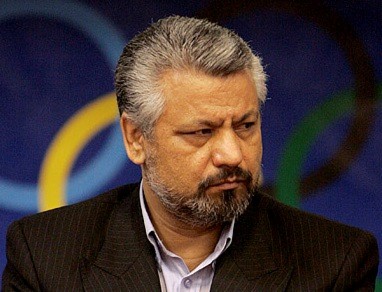
Mohammed "Don't-worry-be-happy" Aliabadi, Iran's acting oil minister and former Olympics Committee chair, says there is plenty of cheap oil for everybody, forever.
To hear its members tell it, the issue before the meeting of the Organization of Oil Exporting Countries beginning today in Vienna is whether or not it will choose to increase oil supplies for an increasingly needy world. What concerns the 12 member countries, they say, is merely fine-tuning a system that is working wonderfully, to make sure everyone remains as content as they are now. The current price of oil, around $100 a barrel, is about right, they say, and in the words of the current OPEC president, Iran’s caretaker oil minister Mohammad Aliabadi, “very much due to OPEC’s efforts, the world remains well supplied with oil, with ample spare capacity and adequate stock levels.” Wow. How much better could things get?Depends on whether you’re listening to the murmurings of the billionaire sheiks and imams, or looking at the world as it is. Suppose we take a look?
1. The Well Supplied World. In a large and growing number of countries, serious energy shortages are worsening as summer heat (in the Northern Hemisphere) requires large increases in energy supplies for air conditioning. These shortages are caused only partially by lack of petroleum — decreased hydroelectric production because of drought and coal shortages dominate — but rapidly increase oil demand because generators must replace the missing energy, and generators run on Diesel fuel or gasoline. These sharply increased requirements for liquid fuels are not being met.
Who is affected, so far? Pakistan and China have the worst problems, but serious shortages are reported currently in Egypt, Guyana, the Dominican Republic, India, Japan, El Salvador, Bangladesh, Libya (where gas lines are averaging a mile in length), Mozambique, Nepal, Venezuela, Argentina, Zimbabwe, Kenya, and Tanzania. (Iran itself, whose oil minister says there is no oil problem, exports oil but has to import gasoline, which it sells to its citizens for a fraction of its cost. The regime there faces a choice: go broke from bearing the skyrocketing cost of the subsidies, or fall to riots that start whenever it tries to increase the selling price of fuel.)
The situation is serious enough that last month the International Energy Agency took the unprecedented step of begging oil producers to increase their output to “help avoid the negative global economic consequences which a further sharp market tightening could cause.”
2. Ample Spare Capacity. According to OPEC’s own projections (which are highly suspect because its members have long been in the habit of concealing their real situation from each other, and everyone else), the world is going to want 30 million barrels of oil per day from its members this year, about a million barrels a day more than OPEC is now producing. So Saudi Arabia (along with Kuwait) is calling for OPEC to increase production by 1.5 million bpd and has announced that for its part it will kick its numbers up by 500,000 barrels per day. No problem, except for the following questions:
- Where are the other million barrels a day going to come from? Only the Saudis claim (with decreasing credibility) the kind of reserve production required for an increase of that magnitude.
- Can the Saudis actually deliver? Back in February, Saudi “sources” promised a production increase to compensate for the loss of Libyan oil from the world Market. In fact, Saudi production after the “promise” fell by a million bpd. [See also “Saudi Oil Dreaming: “We Have a Lot of Capacity“]
- If they did deliver, could they export any of it? The Saudis badly need Diesel fuel for generators, in order to keep up with the air-conditioning demands of another hot summer, and to deal with the steadily rising demands of their own people.
- World oil production so far this year has declined by nearly two million bpd. The loss of Libya’s oil accounts for 80% of this decline, but all the other oil-producing countries of the world, despite favorable and rising prices, have not only been unable to reduce the gap, but have added 20% to it. [See also “WikiPeak Oil: Now Do You Believe It? “]
The general media have accepted the OPEC spin that the debate in Vienna this week is about whether OPEC will increase production. In reality, the question is whether it can.
The question is at the moment far more grave in import for the OPEC countries themselves. They have seen the governments of their colleagues toppling into the flames of food and energy shortages. (The Arab Spring uprisings, contrary to popular schmaltz, are not about people loving Democracy, but about people desperate to find their next meal, and enough fuel to get through the day.) When it becomes apparent that peak oil is real, here, and irreversible, the governors of OPEC will be the next to go.
One can see why OPEC fiddles while their world burns, since they have few options but to go down with their ship. What passes all understanding, however, is the notion being successfully maintained in the educated, wealthy and well-informed West that it is only the other end of the boat that is sinking, and that the low-class cabins will flood long before ours.
[For updates of this and other Daily Impact stories and issues, see “The Editor’s Log.”]